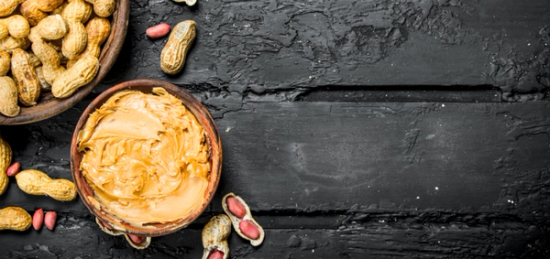Updated By: Jada Linton, RDN, LD
Peanut Nutritional Importance
Not only tasty and versatile, peanuts have a variety of vitamins and minerals in every bite, giving you more energy to live a vibrant life. The Dietary Guidelines recommend a plant-forward way of eating, which definitely includes peanuts, a great plant-based protein option. Some people worry about the fat in peanuts, but most of the fat is good fat – 12 grams of the 14 grams total fat are unsaturated (the kind that we should eat more often). Peanuts and peanut butter provide a flavorful nutritional addition to any meal.
- Peanuts have more protein than any nut (7g per serving), containing more than 30 essential vitamins and minerals, and are a good source of fiber and good fats
Protein
Most often thought of as a nutrient in animal foods like meat, eggs and dairy, protein is also in plant-based foods. Eating a variety of protein sources, including plant-based foods like peanuts, can help provide needed nutrients and reduce the amount of cholesterol (which experts recommend we eat less of) in your diet. For vegetarians, it’s important to eat a variety of plant-based protein to help provide all essential amino acids, since most vegetable sources are deficient in one or more.
With 7 grams per ounce, peanuts have more protein than any nut. Protein is essential for muscle growth and maintenance.
Vitamins, Minerals and More
Peanuts are a good source of (10% of the Daily Value):
- Vitamin E is a dietary antioxidant that helps to protect cells from oxidative stress, a normal, yet damaging, physiological process (1).
- Magnesium is important for muscle function, including the heart, enzyme function and energy production (2).
- Folate is needed for cell division, which means that adequate folate intake is especially important during pregnancy and childhood when tissues are growing rapidly (3).
- Copper is essential for red blood cell formation and for healthy blood vessels, nerves, immune system and bones (4).
- Phosphorus is important for the formation of teeth and bones, cell growth and muscle function, as well as helping the body use vitamins to create energy for cells (5).
- Fiber adds bulk to your diet and helps you feel full longer, while also aiding in digestion (6). In fact, the Dietary Guidelines for Americans urge Americans to consume more fiber-rich plant foods for better health.
Peanuts are an excellent source of (20% of the Daily Value):
- Niacin is an important B vitamin that helps to convert food to energy, aids with the digestive and nervous system, and helps the skin (7).
- Manganese is important for processing cholesterol, and nutrients like carbohydrates and protein (8).
Peanuts also contain other nutrients, including:
- Arginine
- Phytosterols, such as beta-sitosterol
- Potassium
- Resveratrol
- Selenium
- Zinc
Good Fats
The unsaturated fat make-up of peanuts helps link them to a reduced risk of heart disease. According to the Food and Drug Administration, “Replacing saturated fat with similar amounts of unsaturated fats may reduce the risk of heart disease. To achieve this benefit, total daily calories should not increase.” One serving of dry-roasted peanuts (30 grams) contains 12 grams of unsaturated fat, only two grams of saturated fat and no trans fat.
In addition, scientific evidence suggests, but does not prove that eating 1.5 ounces per day of most nuts, including peanuts, as part of a diet low in saturated fat and cholesterol may reduce the risk of heart disease.
Visit our recipe pages for ideas on how to eat more peanuts!
Click here to download a FREE Peanut Nutrition 101 handout.
References:
- Medline Plus. Vitamin E. Available at: http://www.nlm.nih.gov/medlineplus/vitamine.html. Accessed on April 26, 2019.
- Medline Plus. Magnesium in the Diet. Available at: http://www.nlm.nih.gov/medlineplus/ency/article/002423.htm. Accessed on April 26, 2019.
- Medline Plus. Folic Acid. Available at: http://www.nlm.nih.gov/medlineplus/folicacid.html. Accessed on April 26, 2019.
- Medline Plus. Copper in diet. Available at: http://www.nlm.nih.gov/medlineplus/ency/article/002419.htm. Accessed on April 26, 2019.
- Medline Plus. Phosphorus in diet. Available at: http://www.nlm.nih.gov/medlineplus/ency/article/002424.htm. Accessed on April 26, 2019.
- Medline Plus. Dietary Fiber. Available at: http://www.nlm.nih.gov/medlineplus/dietaryfiber.html. Accessed on April 26, 2019.
- Medline Plus. Niacin. Available at: http://www.nlm.nih.gov/medlineplus/ency/article/002409.htm. Accessed on April 26, 2019.
- Medline Plus. Manganese. Available at: http://www.nlm.nih.gov/medlineplus/druginfo/natural/182.html. Accessed on April 26, 2019.
